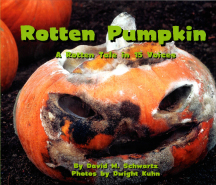
We put the candy cane in a glass filled with water, and then with oil. The candy cane dissolves in the water, making the stripes disappear. But sugar and corn syrup, the main ingredients in candy canes, don't dissolve well in oil. Even when the candy cane rests in oil for several days, the stripes remain. Meanwhile, the segment on the bottom eventually dissolves away, leaving a candy cane hook hanging from the side of the glass.
























